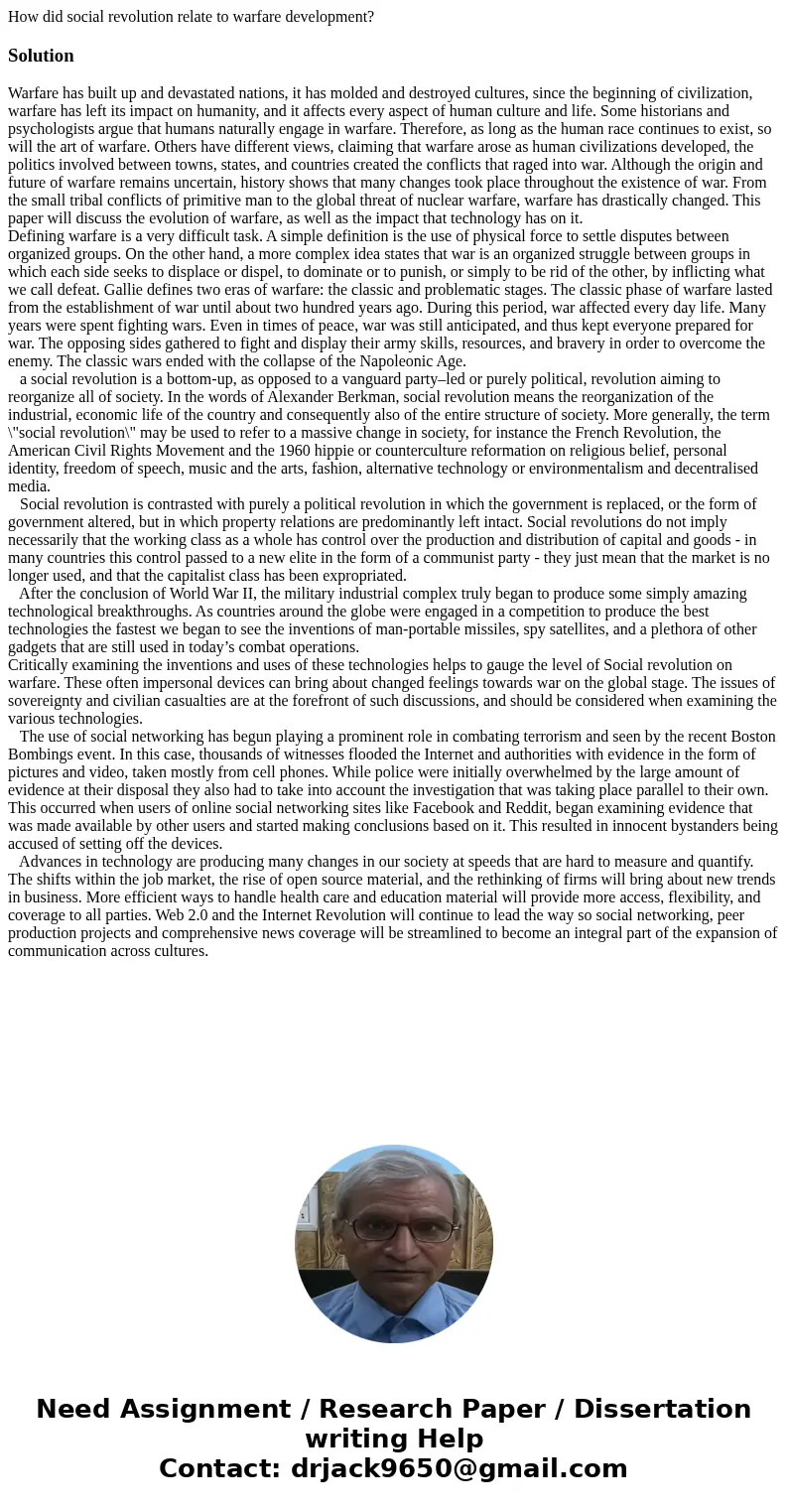How did social revolution relate to warfare developmentSolut
How did social revolution relate to warfare development?
Solution
Warfare has built up and devastated nations, it has molded and destroyed cultures, since the beginning of civilization, warfare has left its impact on humanity, and it affects every aspect of human culture and life. Some historians and psychologists argue that humans naturally engage in warfare. Therefore, as long as the human race continues to exist, so will the art of warfare. Others have different views, claiming that warfare arose as human civilizations developed, the politics involved between towns, states, and countries created the conflicts that raged into war. Although the origin and future of warfare remains uncertain, history shows that many changes took place throughout the existence of war. From the small tribal conflicts of primitive man to the global threat of nuclear warfare, warfare has drastically changed. This paper will discuss the evolution of warfare, as well as the impact that technology has on it.
Defining warfare is a very difficult task. A simple definition is the use of physical force to settle disputes between organized groups. On the other hand, a more complex idea states that war is an organized struggle between groups in which each side seeks to displace or dispel, to dominate or to punish, or simply to be rid of the other, by inflicting what we call defeat. Gallie defines two eras of warfare: the classic and problematic stages. The classic phase of warfare lasted from the establishment of war until about two hundred years ago. During this period, war affected every day life. Many years were spent fighting wars. Even in times of peace, war was still anticipated, and thus kept everyone prepared for war. The opposing sides gathered to fight and display their army skills, resources, and bravery in order to overcome the enemy. The classic wars ended with the collapse of the Napoleonic Age.
a social revolution is a bottom-up, as opposed to a vanguard party–led or purely political, revolution aiming to reorganize all of society. In the words of Alexander Berkman, social revolution means the reorganization of the industrial, economic life of the country and consequently also of the entire structure of society. More generally, the term \"social revolution\" may be used to refer to a massive change in society, for instance the French Revolution, the American Civil Rights Movement and the 1960 hippie or counterculture reformation on religious belief, personal identity, freedom of speech, music and the arts, fashion, alternative technology or environmentalism and decentralised media.
Social revolution is contrasted with purely a political revolution in which the government is replaced, or the form of government altered, but in which property relations are predominantly left intact. Social revolutions do not imply necessarily that the working class as a whole has control over the production and distribution of capital and goods - in many countries this control passed to a new elite in the form of a communist party - they just mean that the market is no longer used, and that the capitalist class has been expropriated.
After the conclusion of World War II, the military industrial complex truly began to produce some simply amazing technological breakthroughs. As countries around the globe were engaged in a competition to produce the best technologies the fastest we began to see the inventions of man-portable missiles, spy satellites, and a plethora of other gadgets that are still used in today’s combat operations.
Critically examining the inventions and uses of these technologies helps to gauge the level of Social revolution on warfare. These often impersonal devices can bring about changed feelings towards war on the global stage. The issues of sovereignty and civilian casualties are at the forefront of such discussions, and should be considered when examining the various technologies.
The use of social networking has begun playing a prominent role in combating terrorism and seen by the recent Boston Bombings event. In this case, thousands of witnesses flooded the Internet and authorities with evidence in the form of pictures and video, taken mostly from cell phones. While police were initially overwhelmed by the large amount of evidence at their disposal they also had to take into account the investigation that was taking place parallel to their own. This occurred when users of online social networking sites like Facebook and Reddit, began examining evidence that was made available by other users and started making conclusions based on it. This resulted in innocent bystanders being accused of setting off the devices.
Advances in technology are producing many changes in our society at speeds that are hard to measure and quantify. The shifts within the job market, the rise of open source material, and the rethinking of firms will bring about new trends in business. More efficient ways to handle health care and education material will provide more access, flexibility, and coverage to all parties. Web 2.0 and the Internet Revolution will continue to lead the way so social networking, peer production projects and comprehensive news coverage will be streamlined to become an integral part of the expansion of communication across cultures.

 Homework Sourse
Homework Sourse